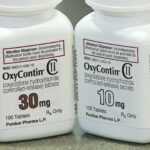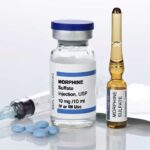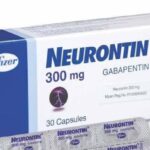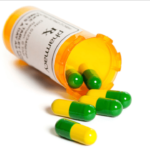Diphenoxylate: Uses, Side Effects, Abuse, Addiction
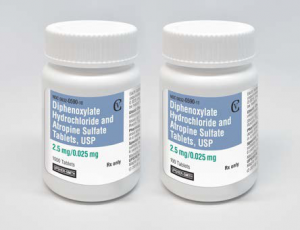
Diphenoxylate is in a class of medications called antidiarrheal agents. It works by decreasing activity of the bowel. Diphenoxylate is a piperidine derivate, chemically related to narcotic meperidine, it acts on opioid receptors in the gastrointestinal tract, thereby decreasing gastrointestinal motility and causing constipation or preventing diarrhea.
Diphenoxylate is used along with other treatments such as fluid and electrolyte replacement for the treatment of diarrhea. Diphenoxylate and atropine combination is used along with other measures (e.g, fluid and electrolyte treatment) to treat severe diarrhea. Diphenoxylate helps stop diarrhea by slowing down the movements of the intestines.
Diphenoxylate is a DEA Schedule 2 controlled substance. Substances in the DEA Schedule 2 have a high potential for abuse which may lead to severe psychological or physical dependence. Diphenoxylate and atropine sulfate tablets are classified as a Schedule V controlled substance.
How should this medicine be used?
Diphenoxylate comes as a tablet and solution (liquid) to take by mouth. It is usually taken as needed up to 4 times a day. Follow the directions on your prescription label carefully, and ask your doctor or pharmacist to explain any part you do not understand. Take diphenoxylate exactly as directed. Do not take more of it or take it more often than prescribed by your doctor.
The oral solution comes in a container with a special dropper for measuring the dose. Ask your pharmacist if you have questions about how to measure a dose.
Your diarrhea symptoms should improve within 48 hours of treatment with diphenoxylate. Your doctor may tell you to decrease your dose as your symptoms improve. If your symptoms do not improve or if they get worse within 10 days of treatment, call your doctor and stop taking diphenoxylate.
Diphenoxylate can be habit-forming. Do not take a larger dose, take it more often, or for a longer period of time than your doctor tells you to. Atropine has been added to diphenoxylate tablets to cause unpleasant effects if this medication is taken in higher doses than recommended.
What side effects can this medication cause?
Diphenoxylate may cause side effects. Tell your doctor if any of these symptoms are severe or do not go away:
- nausea
- vomiting
- loss of appetite
- headache
- restlessness
- tiredness
- confusion
- changes in mood
- stomach discomfort
Some side effects can be serious. If you experience any of these symptoms, call your doctor immediately or get emergency medical attention:
- numbness in arms and legs
- ongoing pain that begins in the stomach area but may spread to the back
- stomach bloating
- shortness of breath
- hives
- rash
- itching
- swelling of the eyes, face, tongue, lips, gums, mouth, hands, feet, ankles, or lower legs
- difficulty swallowing or breathing
- hoarseness
- seeing things or hearing voices that do not exist
Diphenoxylate may cause other side effects. Call your doctor if you have any unusual problems while taking this medication.
Diphenoxylate Safety Information
Before taking diphenoxylate,
- tell your doctor and pharmacist if you are allergic to diphenoxylate, atropine, any other medications, or any of the other ingredients in diphenoxylate tablets or solution. Ask your pharmacist for a list of the ingredients.
- tell your doctor and pharmacist what other prescription and nonprescription medications, vitamins, nutritional supplements, and herbal products you are taking or plan to take. Be sure to mention any of the following: medications containing alcohol (Nyquil, elixirs, others); antihistamines; cyclobenzaprine (Amrix); barbiturates such as pentobarbital (Nembutal), phenobarbital, or secobarbital (Seconal); benzodiazepines such as alprazolam (Xanax), chlordiazepoxide (Librium), clonazepam (Klonopin), diazepam (Diastat, Valium), estazolam, flurazepam, lorazepam (Ativan), oxazepam, temazepam (Restoril), and triazolam (Halcion); buspirone; medications for mental illness; muscle relaxants; other opioid-containing medications such as meperidine (Demerol); sedatives; sleeping pills; or tranquilizers. Also tell your doctor or pharmacist if you are taking the following medications or have stopped taking them within the past two weeks: monoamine oxidase (MAO) inhibitors such as isocarboxazid (Marplan), linezolid (Zyvox), methylene blue, phenelzine (Nardil), selegiline (Eldepryl, Emsam, Zelapar) or tranylcypromine (Parnate). Your doctor may need to change the doses of your medications or monitor you carefully for side effects. Many other medications may also interact with diphenoxylate, so be sure to tell your doctor about all the medications you are taking, even those that do not appear on this list.
- tell your doctor if you have jaundice (yellowing of the skin or eyes caused by liver problems); bloody diarrhea; diarrhea along with a fever, mucus in your stool, or abdominal cramps, pain, or swelling; or diarrhea that happens during or shortly after taking antibiotics. Your doctor will probably tell you not to take diphenoxylate.
- tell your doctor if you have Down syndrome (an inherited condition causing a range of developmental and physical problems), or if you have or have ever had ulcerative colitis (a condition which causes swelling and sores in the lining of the colon [large intestine] and rectum), liver, or kidney disease.
- tell your doctor if you are pregnant, plan to become pregnant, or are breastfeeding. If you become pregnant while taking diphenoxylate, call your doctor.
- before having surgery, including dental surgery, tell the doctor or dentist that you are taking this medicine.
- you should know that this drug may make you drowsy and dizzy. Do not drive a car or operate machinery until you know how this medication affects you.
- ask your doctor about the safe use of alcoholic beverages while you are taking diphenoxylate. Alcohol can make the side effects from diphenoxylate worse.

